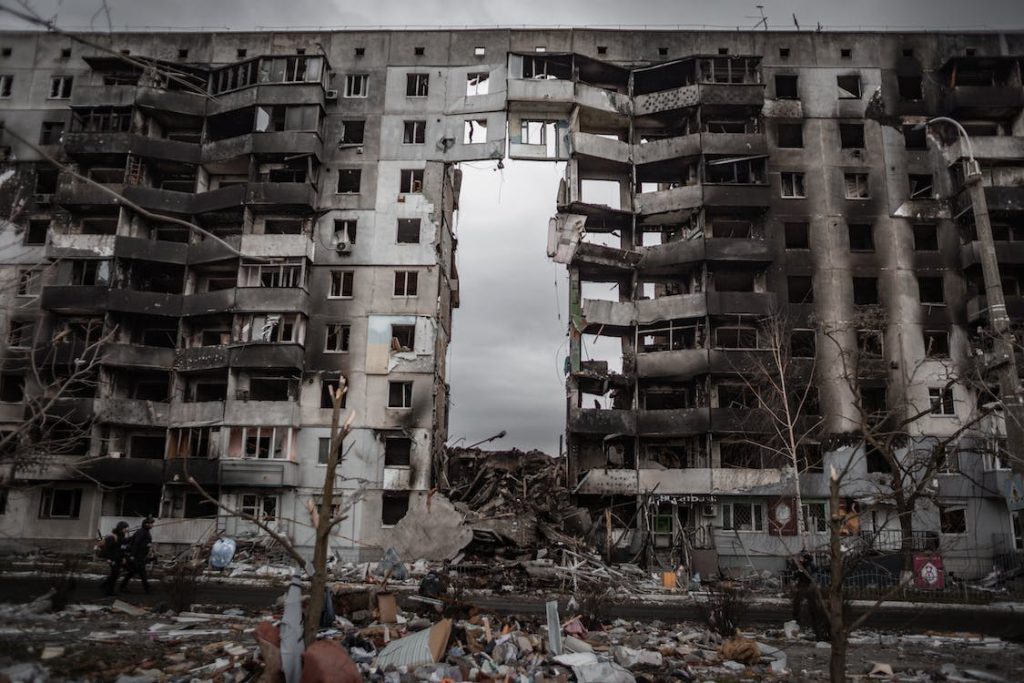How to Navigate If There Is a War: Essential Tips and Guidelines


How to Navigate If There Is a War: Essential Tips and Comprehensive Guidelines


Living in a world affected by conflicts and potential wars can be unsettling and challenging. While we all hope for peace, it’s crucial to be prepared and informed about what to do if there is a war in your region. This comprehensive guide will provide you with essential tips and guidelines on how to navigate through such a situation, ensuring the safety and well-being of yourself and your loved ones.
1. Understanding the Situation
In times of uncertainty, staying informed is of utmost importance. Keep track of reliable news sources to understand the current situation, potential threats, and developments in your area. Pay attention to government advisories and emergency alerts to stay updated about the security situation.
2. Create a Family Emergency Plan
Develop a comprehensive family emergency plan that involves all family members. Sit down together and discuss the potential risks, evacuation routes, and meeting points. Assign specific responsibilities to each family member, ensuring everyone knows what to do if the need arises.
Outline the steps to take if you need to evacuate your home or find shelter in a safer location. Practice the evacuation plan with your family so that everyone knows what to do in case of an emergency.
3. Prepare an Emergency Kit
Assemble a well-stocked emergency kit that includes essential supplies to sustain you and your family for several days. The kit should include non-perishable food items, bottled water, first-aid supplies, flashlight, extra batteries, a battery-powered radio, personal hygiene items, important documents (IDs, passports, insurance papers), and cash.
Regularly check and update the emergency kit to ensure that all items are in good condition and have not expired.
4. Know the Shelter Locations
Familiarize yourself with the nearest emergency shelters and safe locations in your community. In the event of an attack or an immediate threat, knowing where to seek shelter can be life-saving. Discuss these locations with your family during the development of your emergency plan.
5. Stay Informed about Evacuation Plans
Stay tuned to local authorities, government websites, and official social media channels for updates on evacuation plans and procedures. If evacuation becomes necessary, follow the instructions provided by the authorities and evacuate immediately if advised to do so.
Plan alternative evacuation routes in case your primary route is blocked or unsafe. Ensure that your vehicle is well-maintained and has a full tank of fuel at all times.
6. Avoid High-Risk Areas
During wartime, it’s crucial to avoid unnecessary travel and stay away from areas that might be targeted during conflicts. Stay informed about the latest developments and areas to avoid. Keep a low profile and avoid crowded places where risks of attacks might be higher.
7. Keep Emergency Contacts Handy
Save emergency contact numbers of local authorities, medical services, and your embassy or consulate if you’re in a foreign country. Program these numbers into your mobile phone and have a charged phone with you at all times.
Also, have the contact information of family members and close friends readily available, so you can stay connected in case of separation during an emergency.
8. Seek Refuge with Trusted Individuals
If you’re unable to reach your family members during a crisis, seek refuge with close friends or relatives. Staying together during challenging times provides comfort and support.
Having a network of trusted individuals can offer emotional and physical support, and you can work together to ensure the safety of everyone involved.
9. Follow Curfews and Guidelines
Comply with curfews and guidelines imposed by local authorities. These measures are designed to keep you safe and protect communities during turbulent times. Ignoring curfews or guidelines can put you at risk and create additional burdens for emergency responders.
10. Stay Calm and Supportive
During emergencies, it’s essential to remain calm and supportive to those around you. Keeping a positive attitude can help reduce stress and foster a sense of community. Be mindful of your words and actions, as they can have a significant impact on others.
Offering emotional support to family members, friends, and neighbors can help strengthen bonds and create a support system during challenging times.
11. Coping with Stress during Wartime
Coping with stress during wartime can be overwhelming. Here are some additional tips to help you maintain emotional well-being:
Stay Informed but Limit Exposure
Stay informed about the situation, but try to limit your exposure to distressing news and images. Continuous exposure to traumatic events can contribute to heightened stress levels and anxiety.
Practice Deep Breathing and Relaxation Techniques
When feeling overwhelmed, practice deep breathing and relaxation techniques to calm your mind and body. Meditation, yoga, or engaging in hobbies can also help reduce stress levels.
Engage in Physical Activities
Physical activities such as walking, jogging, or doing exercises at home can help release tension and improve your mood. Regular exercise is beneficial for both physical and mental well-being.
Stay Connected with Supportive Individuals
Stay connected with friends and loved ones, either in person or through virtual means. Talking to supportive individuals can provide comfort and emotional relief during difficult times.
Seek Professional Help if Needed
If you find it challenging to cope with stress and emotions, consider seeking professional help from mental health experts. They can provide valuable guidance and support to help you process emotions and trauma effectively.
12. Develop a Communication Plan
In situations where traditional communication channels might be disrupted, it’s essential to have a backup communication plan. Agree on a designated contact person outside the affected area whom everyone can reach out to in case of separation.
Use alternative means of communication such as social media, messaging apps, or satellite phones if possible.
13. Secure Your Home
Secure your home against potential threats. Reinforce doors and windows, and install locks and bolts to make it more difficult for intruders to enter. Create a safe room in your home where your family can seek shelter during an emergency.
14. Familiarize Yourself with Emergency Procedures
Learn basic first-aid techniques and familiarize yourself with emergency medical procedures. This knowledge can be invaluable in providing immediate assistance to yourself and others in case of injuries during wartime.
15. Build a Community Support Network
Connect with your neighbors and build a community support network. Together, you can share resources, provide assistance to those in need, and work collaboratively to enhance community safety and well-being.
16. Learn Basic Self-Defense
Consider taking self-defense classes to learn basic techniques for personal protection. While the goal is to avoid confrontation, knowing how to protect yourself can be empowering in case of emergency situations.
17. Plan for Pet Safety
If you have pets, include them in your emergency plan. Prepare a pet emergency kit with food, water, medications, and other essentials. Identify pet-friendly shelters or accommodations where you can take your pets if needed.
18. Stay Hydrated and Nourished
In times of crisis, it’s essential to stay hydrated and nourished. Maintain a balanced diet and drink enough water to keep your body healthy and resilient.
19. Stay Positive and Resilient
During challenging times, maintaining a positive and resilient mindset can make a significant difference. Focus on finding moments of joy and gratitude, even amidst difficulties.
20. Reconnect After the Crisis
After the crisis has passed, take the time to reconnect with family and friends who might have been separated during the wartime situation. Offer support and understanding as everyone processes their experiences.
21. Support Local Relief Efforts
Support local relief efforts and organizations that provide aid and assistance to those affected by the war. Donating time, money, or resources can make a significant difference in helping others during difficult times.
22. Foster a Sense of Unity
Encourage a sense of unity within your community. Work together, support one another, and show kindness and compassion, as these qualities can strengthen the fabric of society during challenging times.
23. Learn Basic First Aid
Having basic first aid knowledge can be crucial in providing immediate medical assistance to yourself and others if medical help is delayed or not readily available.
24. Prioritize Mental Health
Pay attention to your mental health and the mental well-being of those around you. Reach out for professional help if needed and encourage others to do the same if they are experiencing emotional distress.
Remember that every situation is unique, and there is no one-size-fits-all approach to dealing with wartime circumstances. Prioritize your safety, stay informed, and support one another through these challenging times.
25. Stay Informed About Humanitarian Aid
Keep yourself updated on humanitarian aid organizations that are providing assistance in war-affected regions. These organizations may offer vital support, such as food, medical supplies, and shelter, to those in need.
26. Develop a Communication Network
Establish a communication network with neighbors, friends, and family members in nearby areas. This network can be valuable for sharing information and providing mutual aid during the crisis.
27. Have a Backup Power Source
Invest in a backup power source, such as a generator or solar panels, to ensure you have access to electricity during power outages caused by wartime disruptions.
28. Stay Prepared for Power Outages
Have essential items on hand for power outages, such as battery-operated lights, candles, and power banks to charge electronic devices.
29. Educate Children on Safety Measures
Teach children about safety measures during wartime and how to respond to emergencies. Practice evacuation drills with them to ensure they know what to do if the situation arises.
30. Have Cash on Hand
Keep a reasonable amount of cash on hand in small denominations. ATMs and electronic payment systems may be unavailable during wartime, and cash can be crucial for purchasing essentials.
31. Secure Important Documents
Make copies of essential documents, such as identification cards, passports, and important medical records. Store them in a waterproof and fire-resistant container to ensure they remain safe during any crisis.
32. Support Local Businesses
During wartime, local businesses may face challenges. Supporting them by purchasing their goods and services can help them stay afloat and contribute to the resilience of the community.
33. Monitor Air Quality
If the war results in environmental pollution, monitor air quality levels regularly. Invest in air purifiers if necessary to maintain indoor air quality.
34. Prioritize Water Safety
Ensure access to clean and safe drinking water. If tap water may be compromised, have water purification methods or water filters available.
35. Plan for Pet Evacuation
If you have pets, include them in your evacuation plans. Identify pet-friendly shelters or accommodations and pack essentials for their well-being.
36. Follow Government Evacuation Orders
Adhere to government evacuation orders promptly and without hesitation. Your safety is the top priority during a crisis.
37. Engage in Community Exercises
Participate in community exercises or drills that simulate emergency situations. These exercises can help you practice your emergency plan and identify any areas that need improvement.
38. Encourage Responsible Media Consumption
Encourage responsible media consumption during wartime. Balance information from multiple sources and avoid sharing unverified or sensational news that may cause panic.
39. Show Gratitude to First Responders
Show appreciation and gratitude to first responders, healthcare workers, and those who tirelessly work to ensure the safety and well-being of the community during wartime.
40. Stay Resilient and Hopeful
Remember that hope and resilience are powerful forces. Stay focused on a positive future and work together as a community to rebuild and recover from the impact of war.
Remember, the key to surviving wartime is preparation, vigilance, and supporting one another. By following these tips and staying informed, you can increase your chances of navigating through challenging times successfully.
What are the Most Important Gadgets to Have During War?
Introduction
During war or any emergency situation, having the right gadgets and tools can significantly improve your chances of survival and help you stay connected and informed. Here are some of the most important gadgets a person should have with them during war:
1. Emergency Radio
A battery-powered or hand-crank emergency radio can provide you with essential updates, news, and information during power outages or when other communication channels are down.
2. Multi-Tool
A multi-tool, such as a Swiss Army knife, can serve multiple purposes like cutting, opening cans, and basic repairs.
3. Flashlight
A durable and reliable flashlight is crucial for navigating in the dark and during power outages.
4. Portable Power Bank
A portable power bank can keep your electronic devices charged when access to electricity is limited.
5. Solar Charger
A solar charger can harness solar energy to charge your devices and keep you connected.
6. First Aid Kit
A comprehensive first aid kit should include bandages, antiseptic wipes, pain relievers, and other medical supplies.
7. Water Filtration Device
A portable water filtration device can purify water from various sources and make it safe for drinking.
8. Tactical Backpack
A sturdy and functional tactical backpack can help you carry essential items comfortably.
9. Gas Mask
In the event of chemical or biological threats, a gas mask can protect your respiratory system.
10. Emergency Blanket
Also known as space blankets, these are lightweight and provide thermal insulation to retain body heat.
11. Compass
A compass can help you navigate and find your way if GPS and digital systems fail.
12. Handheld GPS Device
A handheld GPS device can be useful for precise navigation and location tracking.
13. Portable Shelter
A compact and lightweight tent or tarp can provide temporary shelter during emergencies.
14. Whistle
A whistle can be used to signal for help and draw attention to your location.
15. Emergency Flares
Emergency flares can be used as distress signals to attract attention in case of an emergency.
16. Two-Way Radio
A set of two-way radios can facilitate communication with family members or a group in your vicinity.
17. Battery-Powered Fan
In hot and humid climates, a battery-powered fan can provide relief and prevent heat-related illnesses.
18. Portable Gas Stove
A portable gas stove can be handy for cooking when conventional cooking facilities are unavailable.
19. Signal Mirror
A signal mirror can be used to reflect sunlight and attract rescuers’ attention from a distance.
20. Solar-Powered Lantern
A solar-powered lantern can provide lighting during the night and can be recharged using solar energy.
Food that is good to have during wartime
Non-Perishable Food Supplies
Having a stockpile of non-perishable food items is crucial during war or any emergency situation. Choose foods that do not require refrigeration and have a long shelf life. Canned goods, dried fruits, nuts, granola bars, and ready-to-eat meals are good options. Ensure you have enough food to sustain yourself and your family for an extended period.
Water Storage Containers
Water is essential for survival, so having water storage containers is vital. Store enough water for each person in your household to have at least one gallon per day for drinking and sanitation. If possible, also have water purification tablets or a portable water filter as a backup for purifying water from questionable sources.
Portable Camping Stove
A portable camping stove or a compact gas burner can be useful for cooking meals during wartime when regular cooking facilities might be unavailable. Make sure to have enough fuel to last for an extended period.
Freeze-Dried Foods
Freeze-dried foods are lightweight and have a long shelf life, making them an excellent addition to your emergency food supplies. These foods retain their nutritional value and require minimal preparation.
MREs (Meals Ready-to-Eat)
MREs are pre-packaged meals used by the military and are designed to be easily consumed in challenging conditions. They are a convenient option for emergency food, as they do not require cooking and provide a balanced combination of nutrients.
Energy Bars and Protein Powders
Energy bars and protein powders can provide quick and efficient sources of nutrients and energy during wartime or emergencies. They are compact and easy to carry, making them ideal for situations where regular meals are not readily available.
Infant Formula and Baby Food
If you have infants or young children, be sure to include an adequate supply of infant formula and baby food in your emergency supplies. Consider their specific dietary needs when planning your food stockpile.
Long-Lasting Snacks
In addition to regular meals, have a variety of long-lasting snacks like dried fruits, nuts, trail mix, and crackers. These snacks can provide quick energy boosts and help maintain morale during challenging times.
Vitamins and Supplements
Include a supply of essential vitamins and supplements in your emergency kit to ensure that you meet your nutritional needs, especially if your diet becomes limited during wartime.
Comfort Foods
During stressful situations, having comfort foods or treats can provide a sense of normalcy and comfort. Include some of your favorite comfort foods in your emergency supplies.
Remember to regularly check the expiration dates of your food supplies and rotate them as needed to ensure their freshness and effectiveness. Having an ample and diverse food stockpile can significantly contribute to your well-being and resilience during wartime or any crisis.








